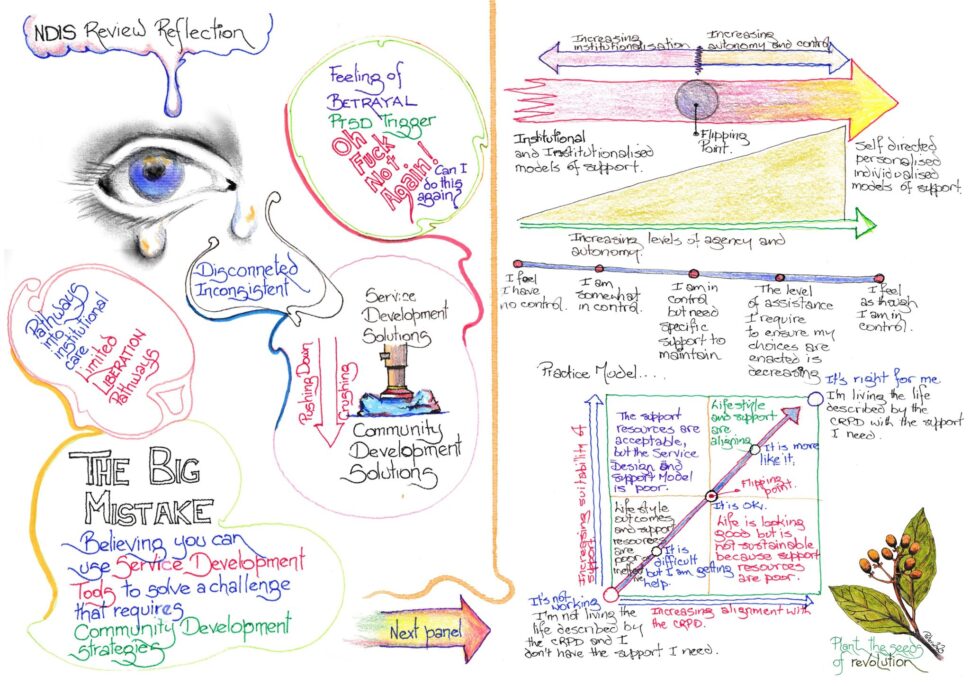The NDIS Review housing and living recommendations are “outdated and unethical”

The recommendations appear to return us to the paternalism and ableism we have been trying so desperately to leave behind.
Forcing us to share support leave us at risk of abuse.
Within the Housing and Living section of the Review report, the recommendation is that “In general, reasonable and necessary funding should be based on an average shared support ratio of 1:3 (for people requiring 24/7 support.)” Despite the intention of this recommendation, it perpetuates the myth that the primary and default model of support for people with complex needs is shared support in a group residential facility. Reports from Participants clearly show that this benchmark is being used by the NDIA Home and Living decision makers in a brazen and unapologetic strategy to use the most simplistic, unethical, and discredited model of support to dictate the lifestyle choices of individual Participants. These Home and Living decisions; that dictate to Participants that they should live in congregate care facilities; are occurring in spite of substantial evidence to show that grouping people with complex support needs together leads to abuse, neglect, and exploitation.
Planning should be individualised
There is no evidence that 1:3 shared support is a suitable level of funding for people requiring 24/7 assistance to deliver on the opportunities for social and economic participation promised by the NDIS. This means that it is an ineffective benchmark and, therefore, should be replaced by a commitment that every participant has their personal budget established through an individual planning process rather than using this outdated congregate care methodology. Despite assurances that this recommendation will not result in people being forced into co-tenancies, history tells us that this is precisely what will happen.
The recommendation will act as a disincentive to the exploration of alternative support models.
The NDIA must adapt their approach.
This recommendation also exposes a basic flaw in the beliefs that drive the Review’s approach to identifying solutions. That is, in stating that the default funding option is based on an outdated and discredited approach to support that is not evidence based, they have sought to provide solutions that are based on the old structures, beliefs and strategies that have failed to deliver the flexible support options we were promised. We must cease using these approaches and language, and commit to establishing funding models based around the needs of each participant and commit to a full implementation of the UNCRPD by adopting solutions that create alternatives to congregate care facilities for all participants.
We must be abundantly clear in our commitment to promote opportunities for all participants who find themselves trapped in group homes to transition to more suitable and personalised support options. If the recommendation of 1:3 shared support is indeed intended to eradicate the large group congregate care residential facilities, then this must be clearly stated while at the same time making it abundantly clear that the proposal is an interim step towards breaking down these large group settings.
If we are to move forward, we must remove the idea of shared support as a basis for calculating reasonable and necessary funding from the policy framework and replace it with strategies that promote a personalised, individualised and community centred funding approach. This should be combined with extensive research that explores the full range of supports people needing 24/7 support require to experience opportunities for social and economic participation.
About Peter Gregory:
I am a self-confessed grumpy old man when it comes to the debacle we refer to as disability social policy. Having spent over 50 years of my life embroiled in grassroots initiatives to challenge and break down the institutions and systems that have denied disabled citizens their fundamental human rights, I have seen decades of promises made, hopes raised and promises broken. The NDIS was to be a scheme for the people and by the people. The NDIS was our best attempt at getting the social policy settings right, but that intent has been diluted by vested interests, short sighted and inconsistent policy development and a lack of commitment to the UNCRPD fuelled by the deep vein of ableism that runs through our disability care and support systems.
We want to hear what you think! Please fill out our survey to share your thoughts on the recommendations in the Independent NDIS Review Report.

Join the conversation